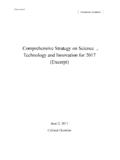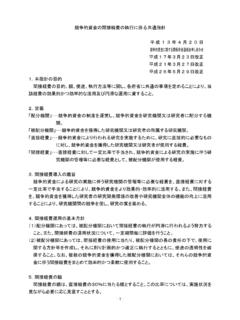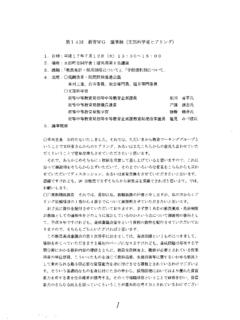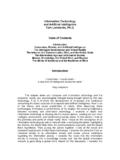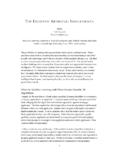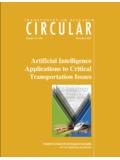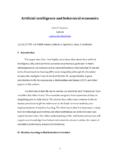Transcription of Report on Artificial Intelligence and Human Society ...
1 Report on Artificial Intelligence and Human Society unofficial translation March 24th, 2017 Advisory Board on Artificial Intelligence and Human Society 1 Preface Artificial Intelligence (AI) is expected to transform our Society , not only by substituting for routinized tasks but also by supporting and enhancing Human activities and decision making. In its 5th Science and Technology Basic Plan (2016 2020), Japan introduced a new concept, namely Society , as a way by which to guide and mobilize action in science, technology, and innovation to achieve a prosperous, sustainable, and inclusive future that is, within the context of ever-growing digitalization and connectivity, empowered by the advancement of AI. With its potential to equip and better shape our Society with new services, businesses, social structures, values, and welfare, AI is perceived as a fabulous enabler, but its benefits to Society will deeply depend on the way it will be implemented and used in real socioeconomic systems.
2 One may have concerns about the quick advancement of AI and its implementation in Society . This is why the Advisory Board on Artificial Intelligence and Human Society was set up in May 2016 under the initiative of the Minister of State for Science and Technology Policy with the aim to assess different societal issues that c ould possibly be raised by the development and deployment of AI and to discuss its implication for Society . The advisory board was expressly composed of members with various backgrounds in fields such as engineering, philosophy, law, economics, and social sciences. The advisory board finally published a Report that includes a summary of the issues to be addressed regarding AI and Human Society . I would like to share ideas and excerpts from this Report with you to encourage communication and potential future cooperation. These issues should be discussed continuously as AI advances, ideally with international cooperation.
3 Yuko Harayama, PhD Chair of the advisory board, and Executive Member, Council for Science, Technology and Innovation (CSTI), Cabinet Office, Japan 2 Board Members Chair Yuko Harayama Executive Members of the Council for Science, Technology and Innovation Noriko Arai Professor, Director of Research Center for Community Knowledge, National Institute of Informatics Arisa Ema Project Assistant Professor, Science Interpreter Training Program, Komaba Organization for Educational Excellence, College of Arts and Sciences, The University of Tokyo Shinya Ouchi Professor, Graduate School of Law, Kobe University Fumio Shimpo Professor, Department of Policy Management, Keio University Shoko Suzuki Professor, Graduate School of Education, Kyoto University To r u Nishikawa President and CEO, Preferred Networks, Inc. Kazuo Hashimoto Professor, Center for Research Strategy, Waseda University Izumi Hayashi Attorney-at-Law, Sakurazaka Law Offices Yutaka Matsuo Project Associate Professor, Department of Technology Management for Innovation, The University of Tokyo Noriyuki Yanagawa Professor, Graduate School of Economics, The University of Tok yo Masazumi Wakatabe Professor, Department of Political Science and Economics, Waseda University Observers.
4 National Strategy Office of Information and Communications Technology, Cabinet Secretariat Intellectual Property Strategy Headquarters, Cabinet Office Ministry of Internal Affairs and Communications Ministry of Education, Culture, Sports, Science and Technology Ministry of Health, Labor and Welfare Ministry of Agriculture, Forestry and Fisheries Ministry of Economy, Trade and Industry Ministry of Land, Infrastructure, Transport and To urism 3 Ta ble of Contents Executive Summary Chapter 1: Introduction Impacts of AI technologies on Human Society Expectations and concerns regarding AI technologies Features of AI technologies differ from previous technologies Purposes of Advisory Board Chapter 2: Overview of activities on AI and Human Society Global trends Trends in Japan Column: Will AI surpass Human Intelligence ? Chapter 3: Approach Categories of cases Overview of Issues Extracting common key issues Chapter 4: Summary of the issues to be addressed regarding AI technologies and Human Society Ethical issues Legal issues Economic issues Educational issues Social issues Research and Development issues Chapter 5: Conclusion 4 Executive Summary Artificial Intelligence (AI) technologies that can perform portions of Human intellectual activities (perception, recognition, decision making, inference, and actions based on the same) have been advancing quickly, especially big data and machine learning.
5 They are being implemented in autonomous cars, diagnosis supports, conversation agents, and others. AI technologies are critical and fundamental for the realization of the Society that Japan s government is promoting, and it is expected to contribute by giving solutions to social problems, such as the labor shortage caused by the low birthrate and aging Society , and to enable every person to play a significant role by utilizing their own abilities. Although AI technologies bring tremendous benefits to Human Society , they might affect Human Society itself fundamentally by advancing without awareness because their development is so fast that it inevitably surpasses the pace of institutional and social adaptation. Thus, the influence of AI technologies on Society should be discussed to ensure that these technologies are used safely and beneficially.
6 Ethical, Legal, and Social Implications (ELSI) surrounding AI technologies are attracting attention internationally, including Japan, and various people as well as researchers and engineers discuss opportunities and concerns regarding AI technologies with great interest. For example, academic organizations, non-profit organizations, governments, and international organizations are discussing and providing policy recommendations on increasing productivity, decreasing heavy work, accelerating science, and finding new medical treatments as good opportunities, and they address job loss and existential risks to humans as concerns. The Advisory Board on Artificial Intelligence and Human Society (Advisory Board) focused on existing AI technologies, those that may foreseeable be realized in the near future, and the Society in which those technologies are or will be implemented.
7 The Advisory Board s objective was to clarify what benefits are expected, what issues are to be concerned, what issues are to be resolved, and what attitudes are beneficial. Digitalization that cannot be dissociated from AI technologies was included in the discussions . Given that AI technologies are being applied in various fields, the Advisory Board took a case-based approach that dealt with various cases in the four representative categories: mobility, manufacturing, personal services, and conversation/communication. The Advisory Board aimed to clarify common key issues of AI technologies and Human Society from a multi-stakeholder point of view, , from the viewpoints of users, researchers, engineers, artists, people across generations, including children, businesses, and governments. AI technologies support and augment Human intellect and actions, and they execute parts of intellectual behaviors on behalf of humans.
8 This is supposed to greatly benefit and empower Human Society and contribute to ensuring its sustainabilit y. The extracted key issues are summarized as follows: Ethical issues: A significant action is to consider the balance between Human decisions and AI-based decisions depending on the situations and objects to be judged. The balance change causes the emergence of a new sense of ethics. If users confirm AI services that enable them to manipulate someone's mind and/or to evaluate people, discussions of ethics might especially be needed. Careful attention contributes to proper AI progress that has the possibility to change 5 Human concepts, since AI technologies augment Human beings senses and abilities. New evaluation procedures have required the observation of the values ( , originality, utility, and virtue) of the products made and actions performed by humans, by AI technologies, and through the cooperation of both.
9 Legal issues: Determining the locus of responsibility for accidents involving AI technology along with preparing insurance for probabilistic risks contributes to social acceptance and helping users understand the risks of utilizing AI technologies. Exploitation of big data while considering information privacy protection requires the consideration of appropriate institutional frameworks (laws, guidelines, and contracts). Considering the rights to and incentives for the creation of AI technologies remains a subject of further study for multi-stakeholders. In-depth analysis and basic research ( , social sciences) play an important role in reconsidering fundamental concepts, such as Human responsibilities, that the modern law is based on. Economic issues: Individuals changing their work style and updating their abilities propose to harmonize each person s abilities with a creative job/task.
10 These changes also require that companies reconsider their decision-making techniques and staff (re)assignment to take advantage of work flexibility. At the government level, combining educational and employment policies is one of the effective procedures for mobilizing labor, revitalizing the economy, and preventing economic disparities. Educational issues: The significant issues are understanding the advantages and limitations of the present AI technologies, properly utilizing AI technologies, and performing creative activities in collaboration with AI technologies. An educational policy functions according to discussions of how to efficiently reform curriculums based on evidence that shows the technologies limitations, the critical Human abilities differentiated from present AI technologies, and the essential Human abilities to be acquired.
